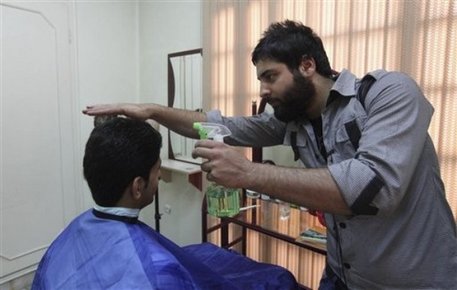
Max Fisher examines the Iranian regime's crackdown on Western hairstyles:
Demographically, Iran should be a democracy. It has high literacy and education rates, a large and vibrant middle class, independent labor and business communities, and a strong tradition of political organizing and involvement. The regime retains authoritarian rule in large part because it firmly controls so much of Iranians' public lives. The regime typically increases these controls in times of social unrest. The baseej, an informal citizen militia loosely tied to the state, can closely monitor their neighbors and brutally enforce state restrictions. Many Iranians become so consumed with navigating these complicated laws that public spaces become places of fear and self-censorship. Because phone taps are common and because your neighbor might be a baseej who closely monitors whoever enters your home, even private spaces are suffocated by state control. Regulating hair styles may not seem like it would be very effective, but this move is part of a sweeping, pervasive strategy to engineer individual freedom out of every imaginable aspect of public life.
I more or less agree with Fisher's summary of the situation, but I wonder if arguing that "even private spaces are suffocated by state control" reveals a critical misunderstanding in Western thinking on Iran's reform movement.
I don't know that this idea - that Iran is a Pyongyang-style police state - meshes with the accounts of most respected Iran scholars or analysts who have spent significant amounts of time in the country. Private life is an incredibly precious thing there, something even this dreadful regime must handle (and regulate) with care. There's a sort of unspoken agreement that the regime can put the public face of its choosing up for window dressing, but an Iranian's home is his or her own, more or less. Of course people are monitored and bugged, but I don't know that Fisher can verify just how pervasive that activity really is beyond anecdotal accounts.
I think the real point here is that the total number of those affected by these codes and regulations - which will likely be ignored by many barbers in short order - is small, and indeed reflective of the size and scope of the so-called Green Movement itself. Stories like this one captivate imaginations in the West because such regulations and restrictions ruffle our own sensibilities, as well as our own interpretations of liberalism, secularism, freedom and so on.
But most Iranians don't care about whether or not they can sport a mullet - they care more about subsidies, taxes, jobs and food. Justice and fairness - basic rights and entitlements (hoqooq) - matter far more than interpretations of secularism, liberalism, or whether or not Western fashion is permitted.
So, yes, Iran would likely look a lot different were the regime not so oppressive, but the real question is whether or not it would resemble the kind of "Western democracy" that might please, well, Western democrats. My guess? Probably not.
And to me, the real tragedy in this week's headlines is the story that wasn't: look at neighboring Turkey, and what it's doing economically in the region with its young, vibrant work force, and take pity on those young, educated - and greatly unemployed - middle class Iranians Fisher notes.
Aside from being an oppressive regime, let us not forget that this is also an incredibly inefficient, insolvent, corrupt and incompetent regime; a fact which likely keeps more than a few Iranians up at night - far more, I'd imagine, than some hairstyle guidelines will.
[h/t: The Dish]
(AP Photo)











